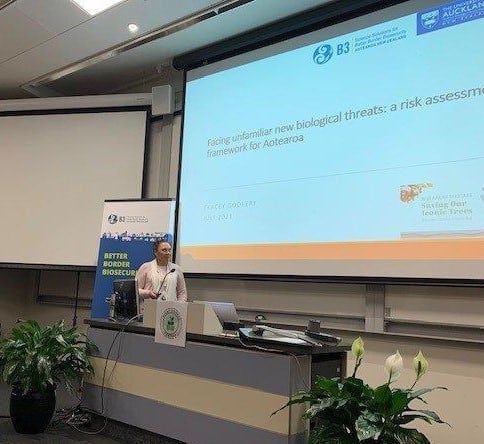Tracey Godfery (representing NZBH and Auckland University) presented her work on a biological threats risk assessment framework for Aotearoa that is underpinned by a Māori world view. She was one of five students B3 supported by the sponsorship of a PhD session at the recent Plant Science Central Conference in early July.
B3 Director David Teulon says the aim of the sponsorship was to support individual PhD students and create a network of passionate young plant biosecurity experts who will lead the field in the future.
“The standard of presentation and research endeavour was impressive. The students’ presentations left me with the impression that we will not need to worry about who will in future take on the mantle of research to restrict the establishment of pests, pathogens and weeds that might threaten New Zealand’s valued productive and natural plant systems. The students all showed the potential to make significant contributions to this critically important undertaking.
Dr Teulon says many students expressed to him how stimulating and it was for them to meet other biosecurity-focused PhDs from around the country and different organisations.
“Developing a cohort of passionate plant biosecurity students is something we should be trying to encourage,“ Dr Teulon says. “We need to develop future opportunities, such as this biosecurity session, where we can bring these students together to share their experiences and feed off each other’s ideas to advance their research and ultimately protect New Zealand from invasive species”.
B3 is a research collaboration funded by Crown Research Institutes and other partners that aims to keep invasive species from establishing in New Zealand.
The B3-sponsored session included PhD students from B3, the BioProtection Research Centre (BPRC), NZBH and several New Zealand universities. Students were at different stages in their PhD programmes, with topics ranging from investigating specific potential biosecurity risks, to novel tools for handling incursions, and system wide analysis for science (including mātauranga) solutions across the biosecurity continuum.
